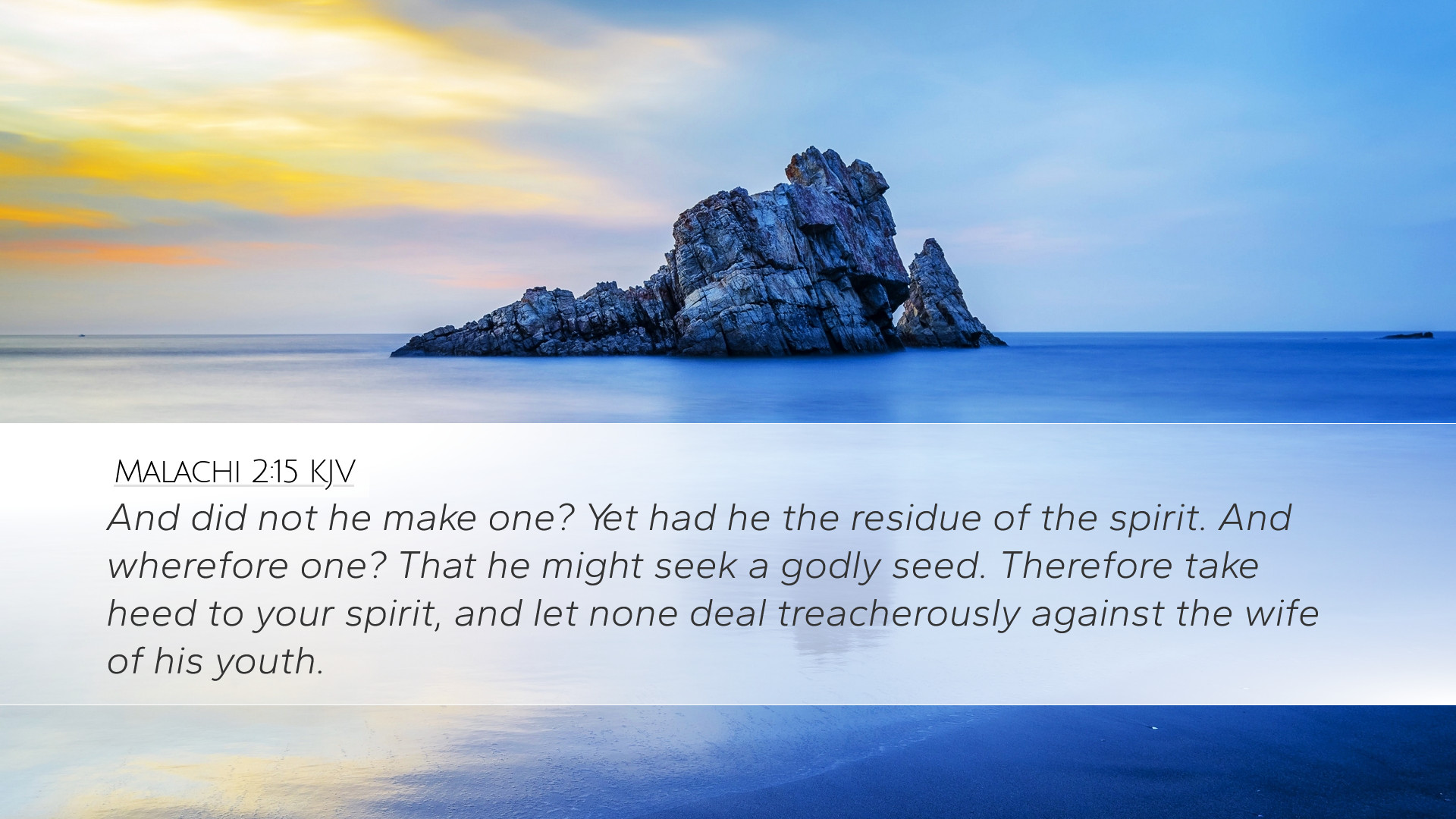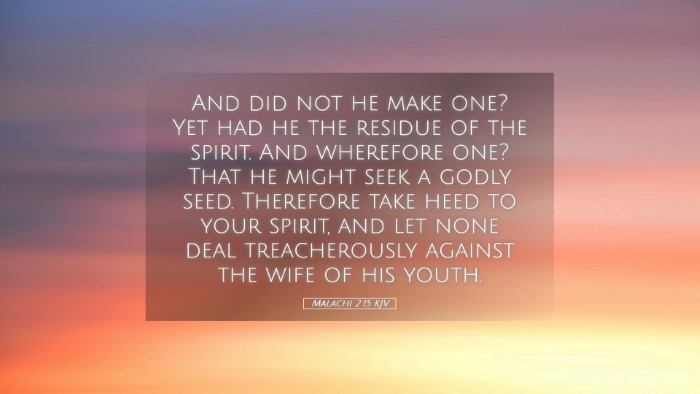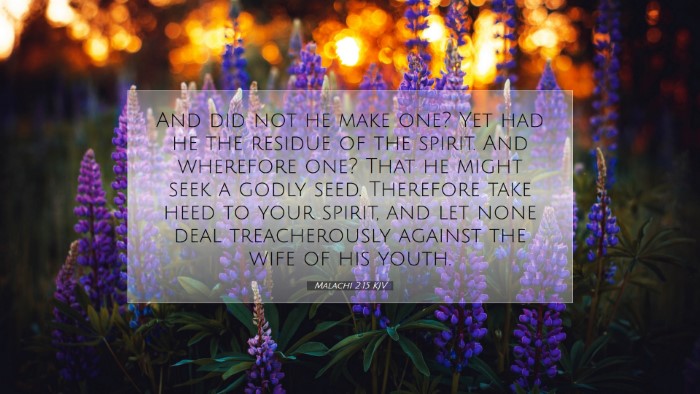Old Testament
Genesis Exodus Leviticus Numbers Deuteronomy Joshua Judges Ruth 1 Samuel 2 Samuel 1 Kings 2 Kings 1 Chronicles 2 Chronicles Ezra Nehemiah Esther Job Psalms Proverbs Ecclesiastes Song of Solomon Isaiah Jeremiah Lamentations Ezekiel Daniel Hosea Joel Amos Obadiah Jonah Micah Nahum Habakkuk Zephaniah Haggai Zechariah MalachiMalachi 2:15
Malachi 2:15 KJV
And did not he make one? Yet had he the residue of the spirit. And wherefore one? That he might seek a godly seed. Therefore take heed to your spirit, and let none deal treacherously against the wife of his youth.
Malachi 2:15 Bible Commentary
Commentary on Malachi 2:15
Malachi 2:15 states:
"And did not he make one? Yet had he the residue of the spirit. And wherefore one? That he might seek a godly seed. Therefore take heed to your spirit, and let none deal treacherously against the wife of his youth."
Introduction
This verse from Malachi deals with the sanctity of marriage and the importance of faithfulness. It reflects the overall theme of Malachi's prophecy, where God addresses issues of faithfulness and integrity, especially concerning marital relationships.
Contextual Background
The prophet Malachi speaks to the people of Israel after their return from exile. The community had fallen into disarray, and many were neglecting God’s covenant. The issues of improper worship, divorce, and unfaithfulness plague them, prompting God to send this message through Malachi.
Verse Analysis
“And did not he make one?”
Matthew Henry remarks that this phrase emphasizes God's original plan for marriage, referencing Genesis 2:24. The unity of man and woman is divinely intended, underscoring the sanctity of the marriage bond.
“Yet had he the residue of the spirit.”
Albert Barnes interprets this as God's ability to create many beings from one, suggesting a divine overflow of spirit. It reflects God's desire for a godly progeny, reinforcing the sacredness of familial responsibilities in covenant fidelity.
“Wherefore one?”
This question unveils God’s intent: to foster a lineage that is faithful not only to each other but also to God. Adam Clarke highlights that God seeks "a godly seed," emphasizing the importance of nurturing faith through generations. This urges couples to look beyond their immediate relationship to the broader implications for their family and community.
Applications and Implications
Marital Fidelity
Malachi 2:15 strongly calls for fidelity within marriage. Matthew Henry elucidates that unfaithfulness is not merely a personal failing; it has communal repercussions. Pastors, students, and theologians should stress the importance of loyalty and commitment in their teachings.
Spiritual Responsibility
The verse also speaks to the spiritual responsibilities of couples. Albert Barnes argues that marriage serves more than a social function; it is a partnership ordained by God to nurture a godly legacy. This reinforces the need for couples to seek God's guidance in their marital journey.
Theological Reflections
The Nature of God’s Covenant
This passage serves as a reminder of God's covenantal nature. God’s commitment to His people mirrors the commitment expected within marital relations. Adam Clarke comments on how God’s covenant is unbreakable, encouraging believers to reflect this nature in their marriages.
Social Justice and Integrity
Malachi’s message addresses issues of social justice, particularly how unfaithfulness impacts communities. In a broader sense, Matthew Henry notes that a community that honors marriage fosters a culture of respect, justice, and integrity, foundational to societal well-being.
Conclusion
In conclusion, Malachi 2:15 holds profound implications for understanding marriage as a God-ordained covenant that requires fidelity, spiritual engagement, and commitment. As pastors, students, and theologians study this text, they are reminded of the broader implications of their teachings on family and community. Upholding the sanctity of marriage is not just a personal commitment but a divine mandate that has lasting impacts across generations.
Key Takeaways
- Marriage is divinely ordained: It is essential for believers to recognize and uphold the sanctity of marriage.
- Spiritual Nurturing: Couples should aim to nurture a legacy of faith, emphasizing the importance of seeking God in their relationship.
- Community Impacts: Fidelity within marriage contributes to societal health; unfaithfulness impacts not just individuals but the community.
Final Thoughts
As we engage with Malachi 2:15, may we all strive to embody the principles of faithfulness, commitment, and godliness in our own lives and relationships, serving as examples to those around us.


